Professorship for Resource Economics
Group Head: Prof. Dr. Svetlana Ikonnikova
On-Going Projects
H2 Global Trade
Competition of H2 Technologies and the Emerging H2 Markets Worldwide
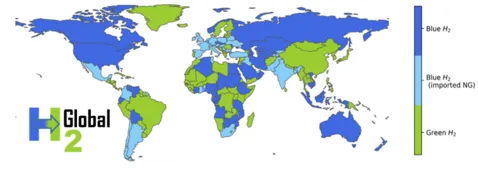
Hydrogen is a versatile carbon-free source of energy that can help re-build our global economy. We focus on developments in hydrogen technologies and with the data on energy resources, their costs and availability around the world, develop a model simulating the emerging H2 markets. Our purpose is to understand: how technical advances along with economic factors will shape the regional hydrogen trade, which countries are likely to export and import H2 and at what price. We combine the macro-level analysis with the micro-level H2 project economics studies, exploring how renewable energy generation can be coupled with H2 production. You can check on our progress here.
Project team: Svetlana Ikonnikova, Ning Lin (UT at Austin), Franziska Holz (DIW Berlin), Olivier Massol ( CentraleSupélec , Industrial Eng. Research Lab.).
The Energy Transition of the Global Economy:
Monetary Costs, Environmental Benefits, and Supply Risks
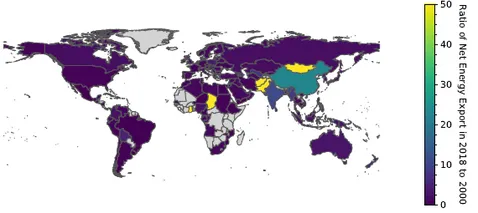
The Energy transition has been accelerating. We analyze the past and expected future changes in energy production, consumption, and international energy trade. Our goal is to understand, project, and advise on the energy transition path, which will allow individual economies to prosper and develop while reducing their emission levels. We take a special look at the energy security implications for the major global energy importing and exporting countries. Read about our first insights here.
Project team: Svetlana Ikonnikova, Sofia Berdysheva (TUM-CEM), Alexander Vaninsky (CUNY, USA).
Sustainable Development of Critical Resources:
Interactive AI for Multi-agent Multi-objective Optimization

Climate change and the carbon-neutrality agenda have led to the introduction of clean energy technologies and spurred the demand for alternative energy sources and new infrastructure. Demand for minerals and metals, such as copper, cobalt, and lithium, needed for production and supply of clean energy, has skyrocketed. Mining of critical resources poses environmental, social, and economic challenges, especially in regions such as “Global South”. Combining the expertise of the TUM School of Management, School of Engineering and Design, and Institute for Ethics in Artificial Intelligence, we suggest new practices for sustainable growth adopting and adapting ethical AI methods such as interactive multi-objective optimization. Read more here.
Project team: Svetlana Ikonnikova, Gen Li (TUM MTG & IEAI), Caitlin Corrigan (TUM IEAI), Walter Timo de Vries (TUM, ED), Pamela Diaz (IHS), Erik P. Tudzi (KNUST), Bridget Scanlon (UT Austin).
Life-cycle Assessment of Integrated Systems:
Evaluating Sustainability of New Technologies Focusing on their Utilization
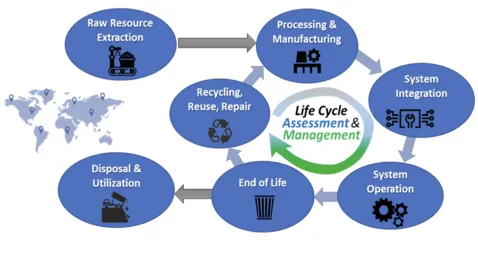
The innovative solutions and clean technologies are eagerly introduced while our understanding of the corresponding supply chains is falling behind, lacking temporal and geographical evaluations. In collaboration with Allianz, our team tries to identify and fill in the gaps in Life-cycle analysis (CA). We work on evaluating the product system’s (in its entirety) footprint, suggesting enhancements in descriptions, and studying the need for involved economic agents to work collaboratively to incentivize the sustainability.
Project team: Svetlana Ikonnikova, Niclas Kurzmann (TUM & Allianz), Diana Khripko (IfM, Cambridge), Alexander Schluter (E.ON).
The Effect of Technology on Interfuel Elasticities:
Energy Transition and the Change in the Fossil Fuel Substitution
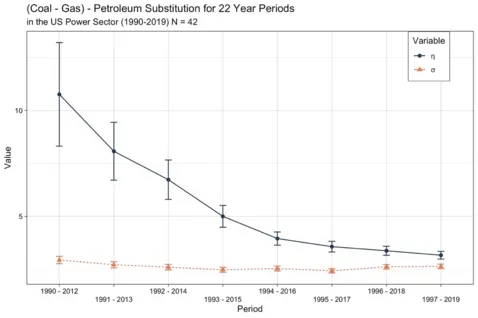
The world currently tries to limit the environmental impacts of fossil energy use. A strategic factor is the change from and between fossil fuels towards technologies with a cleaner carbon footprint. This transition can be measured with the „Elasticity of Substitution (ES)“. High values indicate an easy switch between fuels. We analyze how introducing technological change (namely an increase in fuel efficiencies) influences the ES. We further implement a mechanism to discover how the ES is changing over time. We find that especially the ES between coal and gas is decreasing, meaning it is becoming more difficult to substitute coal with the „cleaner“ natural gas.
Project team: Svetlana Ikonnikova, Daniel Gatscher (TUM-CEM).
Firm’s Perspective on the Decarbonisation
Transitioning of the Technology Portfolio: The Role of Policy and Expectations
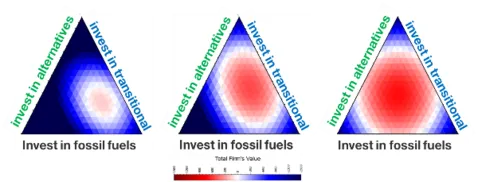
Companies in all the sectors of an economy face a challenge on shifting their activities to reduce carbon footprint. Costs of switching to clean technologies may be high and raise questions on how much and when to invest. We analyze companies decisions and portfolio of projects in order to understand the financial trade-offs of ESG decisions. We model firm’s investment behavior to learn and advise on the transition pathways. Based on the results, we also try to project the likely industry dynamics and foresee possible changes in production. Learn more about the questions here.
Project team: Svetlana Ikonnikova, Sofia Berdysheva (UT at Austin), Victor Neyra (AIE, UK).